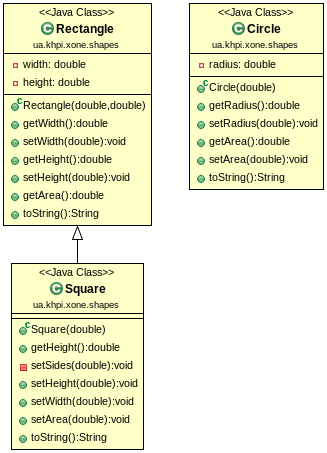| « Previous task | Practice tasks | Next task » |
8. Object-Oriented Programming: Method Overriding, Polymorphism
- The Java Tutorials - Overriding and Hiding Methods.
- The Java Tutorials - Polymorphism.
- w3schools - Java Polymorphism.
- w3schools - Java Abstraction.
- w3schools - Java Interface.
Note: The dictionary definition of polymorphism refers to a principle in biology in which an organism or species can have many different forms or stages. This principle can also be applied to object-oriented programming and languages like the Java language. Subclasses of a class can define their own unique behaviors and yet share some of the same functionality of the parent class.
1) Create and test the following classes: Circle, Rectangle, Square. Implement the necessary methods: getXxx, setXxx, toString.
Class diagram of created classes:

Examples:
2) Create ShapeUtils class, implement the ShapeUtils.printShapes method, as shown below.
public static void printShapes(Object[] shapes) {
for (Object s : shapes) {
System.out.println(s);
}
}
3) Use the following Main class to test implemented functionality:
public class Main {
public static void main(String[] args) {
Object[] shapes = { new Circle(10), new Rectangle(20, 30), new Square(40) };
ShapeUtils.printShapes(shapes);
}
}
You should obtain the following result:
Circle: radius = 10.0
Rectangle: width = 20.0, height = 30.0
Square: width = 40.0
Note: We have: Circle, Rectangle, and Square classes.
Note: We want to be able to:
- Call
getAreaon an instance of any of three, even if we do not know which of the three types it is.- Make an array of mixed shapes and calculate the sum of the areas.
- Make this array-summing method flexible enough to handle future types of shapes (Triangle, Ellipse, etc.).
4) Implement the ShapeUtils.sumAreas method, as shown below.
public static double sumAreas(Object[] shapes) {
double sum = 0;
for (Object s : shapes) {
// sum = sum + s.getArea(); // Illegal! Object does not have getArea
}
return (sum);
}
5) Try to make this method workable. It should return the sum of the areas of the shapes. Modify Main class to test the ShapeUtils.sumAreas method:
Double sum = ShapeUtils.sumAreas(shapes);
System.out.format("%.2f", sum);
If you are using previously created shapes, you should obtain the following result:
2514.16
Hint: Use the super entity (e.g.
Shape) with declaredgetArea()as the parent for your “geometrical” classes.
| « Previous task | Practice tasks | Next task » |